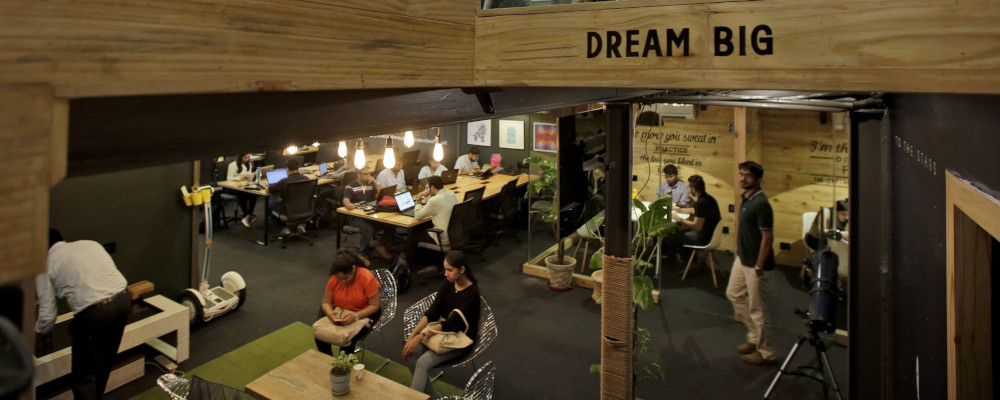Walk into any cafe in Palo Alto, California and you’re sure to witness a strange phenomenon. Strange, that is, if you’re coming from Toronto or any other Canadian city.
Sitting at tables, huddled behind sticker-covered laptops, these are the hubs of entrepreneurs and aspiring entrepreneurs. The whisper you hear around you will be of people talking about their latest idea, the business they started in their Stanford dorm room or celebrating a recent investment from one of the world’s prominent venture capitalists.
Of course, if you hang out for long enough at the corner of King and Spadina in Toronto, you might hear something similar, but you’ll probably be standing there for hours, if not days, first.
For decades, we’ve obsessed about what makes Silicon Valley unique. We’ve tried to replicate it with our own government-sponsored hubs and innovation centres. But for some reason, we still fall short.
In thinking about this problem, it might be helpful to consider a different perspective. Maybe we’re not creating enough entrepreneurs, because we don’t have enough entrepreneurs, or because they’re not “infecting” enough people.
That might sound stupid, but hear me out.
Over the past two years, Canadians have been harshly educated about the spread of contagions and the occurrence of pandemics. In essence, we’ve learned two things about pandemics:
- More people are prone to get infected if they are surrounded by more infected people; and
- The spread of an infection has to do with its own level of transmissibility (or as we now know is called its R0)
So let’s apply these lessons, and imagine a world where we build a pandemic of our own design. But instead of spreading a serious illness, we spread a mentality, a mindset, and a perspective. I’m talking about spreading entrepreneurship as a contagion.
Let’s go back to that cafe in Palo Alto. Why are all those entrepreneurs there? Why is it that as a town, it’s likely 10-100x denser in terms of entrepreneurs per capita?
A few fallacies to dismiss first. No, Americans are not culturally more inclined to entrepreneurship than Canadians. No, Stanford grads are not more intelligent than any grad coming out of a top Canadian university, or any other top American university for that matter. And no, there’s definitely nothing inherent about California that attracts aspiring capitalists.
Is it possible then that Palo Alto is simply living in a constant state of entrepreneurial pandemic?
I guess the first question to ask is whether entrepreneurship is contagious. Matt Clancy, a senior fellow at the Institute for Progress and a professor on the economics of innovation, took a stab at answering this question in a recent post called Entrepreneurship is Contagious.
Although the question cannot be definitively answered, there’s a strong argument made that entrepreneurs beget more entrepreneurs. Or put differently, a person is significantly more likely to consider a career as an entrepreneur if they know others who have already done so.
It’s not much of a stretch to agree with this conclusion. I started my first business six years ago, in large part because of the influence of my brother—an entrepreneur. Since then, all I talk about among my family and my friends is my business. My wife has since gone on to become an entrepreneur, two of my closest friends have, and my brothers and I are venturing into new businesses together as well. Not to say that I caused this, but it’s conceivable that entrepreneurship leads to more entrepreneurship.
Canada’s strategy on this issue should seek to understand this social dynamic. Entrepreneurship is not only about education and funding, it’s about the change in personal identity that it causes. Most people don’t identify themselves based on their job, but entrepreneurs absolutely do. It’s so closely tied to their personal life and brand that it rubs off on the people around them.
So what can we do to kick-start this pandemic of entrepreneurship?
Back to the two lessons we learned about pandemics, we need to: 1) Surround ourselves with entrepreneurs to increase the chance of “infection” and 2) Increase the R0 of entrepreneurship.
On the first point, it’s quite simple. There are 3 things we can do to meaningfully move the dial.
- Keep more of our graduates in Canada, especially coming out of top schools & programs like software engineering at Waterloo or UBC. There are several mechanisms we could look at to accomplish this, including significant reform in our education subsidy programs that would incentivize Canadian graduates to stay in Canada.
- Increase our skilled immigration numbers in entrepreneurship. We already have a great track record of recruiting world-class immigrants to Canada to fill labour market shortages in key areas. Let’s make sure entrepreneurship is one of those areas. Some studies have concluded that over 50 percent of startups in Silicon Valley have had first generation immigrant entrepreneurs behind them.
- Spotlight and celebrate the entrepreneurs we already have in Canada. We have some incredible success stories to be proud of as a country, but we could do more to elevate their profiles. Some of the biggest celebrity names in the U.S. are not athletes or politicians, they’re entrepreneurs. The more we celebrate these types of people, the more we’ll create a culture that wants more entrepreneurs in its midst.
The second part of this strategy is called “Increasing the R0 of entrepreneurship”.
Essentially, when exposed to entrepreneurship, we want people to be more likely to “catch the bug.” There are two sides to this:
- Make entrepreneurship seem more attractive, more sexy, more desirable. At our core, we all want to succeed at something meaningful and be recognized for our work. Too often, entrepreneurs suffer in silence. Although we don’t want to gloss over the fact that this is a tough journey—and it’s NOT for everyone—we should do more to glamorise it. The media should profile more entrepreneurs; the government should point to entrepreneurs as examples of Canadian ingenuity; our universities should encourage students to consider entrepreneurship as a viable career path; our celebrities should partner with entrepreneurs to help grow their profiles.
- Make entrepreneurship seem less risky and less scary. This essentially comes down to incentives. Entrepreneurship is a risky journey. You’re more likely to fail than succeed. So when someone is doing the mental math, they’re asking themselves “What do I have to lose? Probably A LOT, because I’ll probably fail” and “What do I have to gain? Probably NOTHING, because I’ll probably fail.” We need to lower the barriers for people taking their first steps down this path and reduce the downside risks where possible. This could include making entrepreneurs eligible for EI if their venture fails or providing tax incentives to individuals taking enormous personal risks to start companies.
The point of this perspective is not to exhaust every possible policy idea that could positively influence the trend of entrepreneurship in Canada. For what it’s worth, I think the country is already organically seeing a shift in the right direction. But could we move down that path faster and with more intention as a country?
I think we can, and I think we must.
Recommended for You

Laura David: Red pill, blue pill: Google has made its opening salvo in the AI-news war. What’s Canadian media’s next move?

The Notebook by Theo Argitis: Mark Carney’s first major tests

The Weekly Wrap: Trudeau left Canada in terrible fiscal shape—and now Carney’s on clean-up duty

Ben Woodfinden: Lament for an ‘elbows up’ nation




